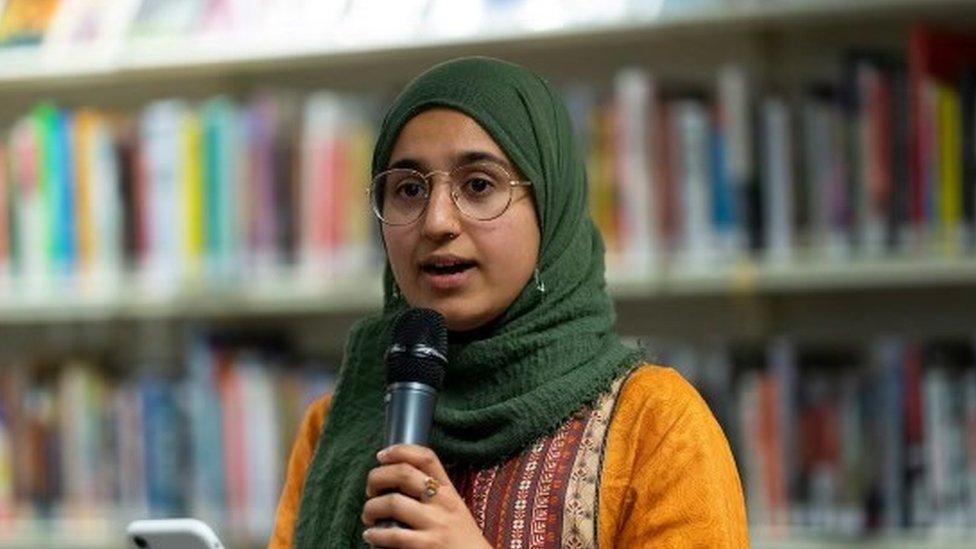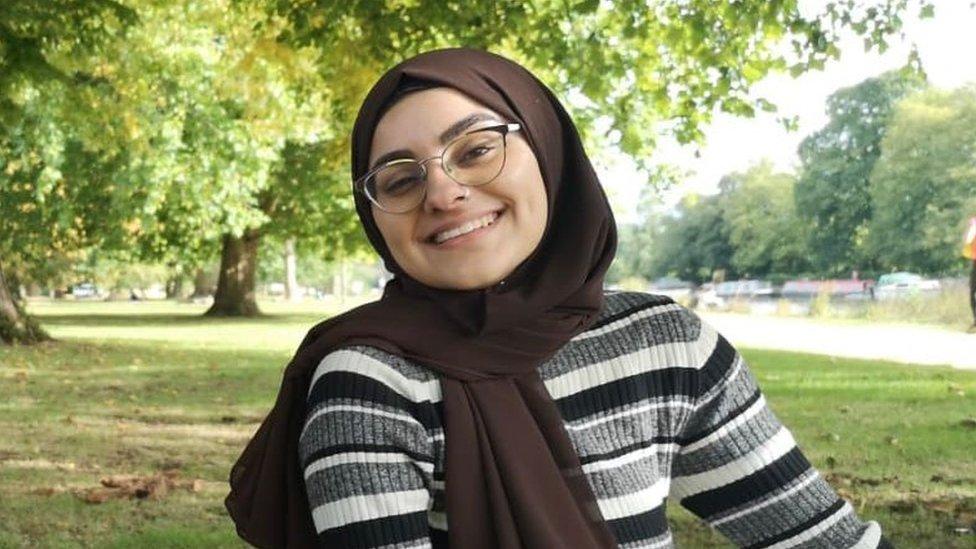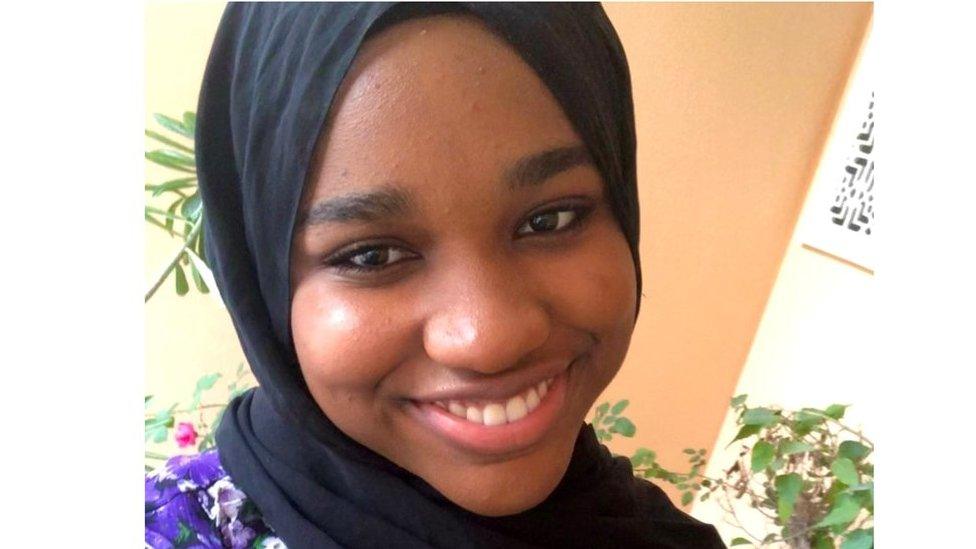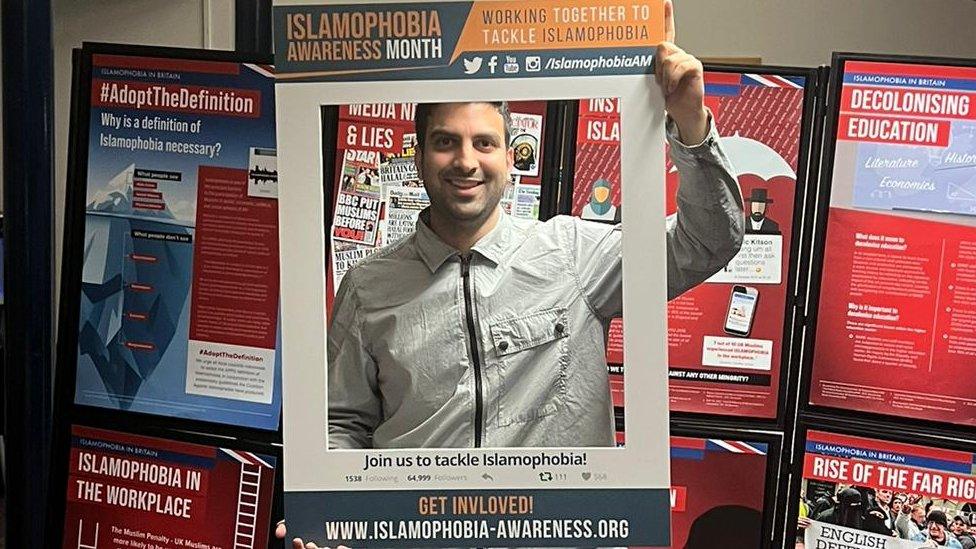Islamophobia 'relegated to Muslim issue', says Bradford author
- Published

Bradford author Suhaiymah Manzoor-Khan says Islamophobia Awareness Month needs greater visibility
An annual campaign challenging Islamophobia is not being taken seriously enough by wider society, a Bradford Muslim author has said.
While Islamophobia Awareness Month had just marked its 10th year, Suhaiymah Manzoor-Khan said it attracted limited interest beyond Muslim communities.
Tackling Islamophobia was very much seen as a "Muslim issue", she said.
Nahid Roshanali, from the campaign, said while engagement in the awareness month had grown, more was still needed.
'Vigorous conversations'
According to its website, Islamophobia Awareness Month (IAM), held every November since 2012, aimed to "showcase the positive contributions of Muslims and raise awareness of Islamophobia in society".
However, Ms Manzoor-Khan, Bradford-born poet and author of Tangled in Terror: Uprooting Islamophobia, said IAM had yet to really enter the wider public's consciousness.
She said, in her view, that showed challenging Islamophobia remained "relegated to a Muslim issue".
"The narrative around Islamophobia makes it seem like a problem Muslims alone deal with," she said.
"But the Islamophobia story has justified repressive policies affecting everyone, like increased surveillance and policing."

Zainab Haider says the wider population does not take Islamophobia Awareness Month seriously
Ms Manzoor-Khan said she believed Islamophobia Awareness Month was a tool to have "vigorous conversations" about the issue.
But she said the "lack of visibility" of IAM even while it was being held in November was "a manifestation of Islamophobia itself".
Ms Manzoor-Khan said: "Islamophobia Awareness Month tells us the history of British society: if the month remains a marginal thing, then nothing will change."
Responding, Nahid Roshanali, IAM's engagement officer, said she disagreed that the campaign did not reach beyond Muslims.
"Muslims are raising awareness, but more non-Muslims are, too," she said.
"Non-Muslims want to support their friends or colleagues and they want to learn more."
However, Ms Roshanali said greater education, such as that on offer during IAM, was needed for that to happen - and that was an ongoing process.
"It's not a Muslim's burden to always be educating others, but nothing changes overnight."
'Positive feedback'
Zainab Haider, a PhD student, said she only knew Islamophobia Awareness Month existed when she began her studies at the University of Leeds.
Ms Haider said it was young Muslims who were the people "driving momentum" when it came to the campaign, rather than other groups.
But she added that there was a limit on the impact the annual campaign could have as "people don't take the month seriously".
"Within higher education, the onus needs to be off Muslim students, and instead the institutions themselves need to do more."
Ms Roshanali, from IAM, said when the campaign was raised within higher education institutions, it was "almost always met with positive feedback".
There was also "nothing wrong with Muslim students flagging the month to their universities", she added.

Maryam Imam says she only became aware of IAM through her university's Islamic Society
Student Maryam Imam said her move to the UK from Qatar to complete her undergraduate degree in Leeds this year had allowed her to see how Islamophobia presented itself differently across countries.
She said she found Islamophobia Awareness Month useful, but agreed it needed to be more widely known.
"In the UK, it [Islamophobia] is always in the back of your mind - especially as a visibly Muslim woman," Ms Imam said.
"I've been able to use this month to learn about people's experiences, but we need to find a way to spread awareness in non-Muslim groups.
"IAM doesn't have enough public visibility. We are educating people who are already aware of the issue."
Ms Roshanali said the limited visibility Ms Imam referred to boiled down to IAM being a grassroots campaign, but she added that the campaign continued to grow.
"This year, we've had more people, organisations and press than ever," she said.
"Not everyone has been shouting their involvement - some is internal - but this doesn't mean it's not happening."
"If you want to see that level of growth, get involved," she suggested.

Shames Maskeen helped organise a half-day conference and workshop in Leeds to mark IAM
One of those who did get involved recently was Shames Maskeen, a lecturer at Leeds Trinity University.
Mr Maskeen said he had worked alongside the student Islamic society since July to plan events for the month.
He said he had organised a half-day conference at the university, including an anti-Islamophobia workshop and a keynote speech.
But Mr Maskeen said: "It's a few students putting in all the work to put IAM on the agenda. There needs to be a better understanding, this is everyone's responsibility."
Following the end of the 2022 event, Ms Roshanali, from IAM, said all eyes were now turning to next November.
"We're hoping to be a lot bigger next year," she said.
Meanwhile, Ms Manzoor-Khan said she looked forward to Islamophobia Awareness Month and the issues it tackled becoming more widely recognised.
"The route to substantive change is raising consciousness," she said.
"If the month can be a means of mobilisation, it can lead to change."

Follow BBC Yorkshire on Facebook, external, Twitter, external and Instagram, external. Send your story ideas to yorkslincs.news@bbc.co.uk, external.